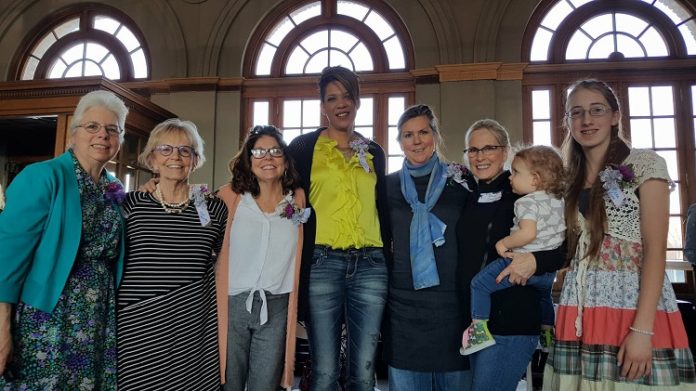
I was hoping to find a female to write this story. After all, how reliable can a factual account — much less opinions — be from the pen of a male on the subject of International Women’s Day and its relation to feminism in the U.S.?
Fake news? I hope not. Only a malicious tongue would utter that phrase. Still, some divides cannot be easily bridged by even the most fertile imagination. I cannot know at first hand what it is to be a female any more than I can know what it is to be, say, an African American or a member of the one percent.
I cannot know as part of my own lived experience the damaging effects of the inequality that is baked into our way of life, of the structured system of subordination that is programmed into American society.
Nonetheless, reports have reached me from those who do know at first hand and they persuade me that while some progress has been made, we’ve got a long way to go. The #MeToo avalanche is a case in point. Will males ever get it? Let’s ask the females.

This year’s public celebration of International Women’s Day in Perry was the brainchild of Carol Jackson-Cavanaugh. Or maybe one should rather say wombchild. Brainchild sounds like a figure of speech males might have come up with in order to compensate themselves for their inferiority relative to the power of female sexual reproduction.
Let’s just say it was Carol’s idea. She conceived it, delivered it, nursed it.
“After having a coffee at my house last year to celebrate, I decided it would be interesting to put something together this year that involved the wider community,” she said. “I decided to settle for five very interesting and intelligent women friends of mine. They all have ties to Perry.”
International Women’s Day is marked around the world every year on March 8, but since March 8 falls this year on a Thursday, Jackson-Cavanaugh decided to host the celebratory coffee on Saturday at La Poste. The date must have been well chosen because some 80 people attended, including four males.
Saturday’s weather was very fair. La Poste was cheerfully decorated, and a generous selection of fresh-baked sweets were freely available, with coffee provided by the Perry Perk coffeehouse next door.
The women speakers were indeed interesting and intelligent. Longtime teacher and former Perry Mayor Viivi Shirley spoke about “A Woman’s Life in Estonia, Sweden and America.” She was born Viivi-Ann Aarma in Estonia in 1940. In 1945 she fled with her family to Sweden as refugees of World War II. The family later immigrated to the U.S. in 1955 and settled in North Dakota.

The Estonian lesson of Viivi’s first five years was one most women learn everywhere: “Basically, women were subservient to men,” she said. In Estonia the law of the paterfamilias prevailed as it did throughout most of Europe: the father or eldest male was the absolute ruler of the family.
“Along with that,” Shirley said, “was also the message — and it was not unspoken. It was made clear that we should understand this — that you were never, ever to be smarter or better or stronger than any man.”
She said her mother struggled with accepting this male rule because “she knew who she was. She was a very competent, intelligent woman full of energy — the inverse of the societal expectations.”
In Sweden came new lessons. Young Viivi learned that Swedish “women were strong. They were strong physically. They were strong intellectually. They were strong emotionally. And on top of that they were very beautiful,” which might translate as strong sexually. Swedish women were “expected to be competent and capable,” and they were “independent and had the right to choose what they wanted to do.”
Unlike the U.S., Sweden was not founded by Puritans, “so sex was openly talked about, and there weren’t any societal bans on women having sex outside of the marriage or being sexually active before marriage.”
She said growing up felt like “living in two worlds,” and she slowly came to “the idea that as a woman, I didn’t have to be the type of woman that my mother was. In a lot of ways, I felt like I was in a minefield. I didn’t have any background and was never taught how to behave except how I was told.”
Then came the move to North Dakota, and more lessons followed: “Number one was to be very, very strong, physically strong and emotionally strong” due to the rigors and remoteness of the climate. “The second thing I learned was that you had to be nice. You were expected to be nice all the time to everybody.”
Intellectually, “it was okay for a girl to be smart, but it wasn’t really smart to be too smart” if you were a North Dakota girl. In bodily matters, “I also learned that sex was absolutely taboo to talk about. The only thing I learned about sex was that only loose girls or women have sex before they’re married.”
Having learned these many conflicting and even contradictory lessons, Viivi-Ann Aarma found herself an adult.
“So I resolved these different messages that I had gotten about the world by getting married at 18,” she said. She and Alan “Pud” Shirley married in 1959 and raised two daughters, Jill and Elise, both of whom attended Saturday’s event with their mother, who has been a widow since 2004.
“And now I look around this room,” Viivi said, “and I see in it people — most of you I have known for, gosh, almost 50 years — and I am amazed at how far women have come in my 77 years.”
Shirley freely embraces the title of feminist even as she remembers conversations from the 1960s when she was called a “feminist as a derogatory term. I was then and I am now proud to be a feminist. A feminist to me has always meant that everybody — men, women, it doesn’t matter what color, what race, what religion, if you’re tall or short, young or old — you’re important. You’re equally important as the next person to you. I look at how far we have come. We can vote. We can do just about anything that we want to do” — except receive equal pay for equal work, a goal she challenged her listeners to reach.
Shirley received sustained applause at the end of her talk. She was followed in turn by four other friends of Carol, each of whom illustrated in her way points that Shirley made about the barriers women face and their means of overcoming them, the triumphs, the tragedies and the slow pace of progress in the direction of equality.
Entrepreneurs were well represented among the speakers. Nancy Collins has owned and operated Dental Ceramics of Iowa City since 1982. In running a small business, “you wear a lot of hats,” Collins said. “You’re the manager, motivator, R&D, IT, HR, salesperson, trainer and all-around cheerleader.”
Collins praised her employees, paying particular tribute to Mary Beth Stout, a staff members who came to Dental Ceramics as an 18-year-old intern and who just turned 53.
“She’s amazing,” Collins said. “I have five employees, and they’ve all been with me for a really long time, and I think that’s how you measure success.” She then described how she came to make dental-care mission trips to the Central American country of Belize.

Dr. Gordon Green, an Indiana dentist of her acquaintance, told her about the mission trips and encouraged her to come along. “He said, ‘You should go,’ and I told him, ‘You know, I did clean teeth in my past life,’ and he’s like, ‘Well, you’re in. Come,’ and I’m like, ‘I haven’t cleaned teeth in 20 years.’ So the next thing I know, I’m in Belize.”
Collins has so far made four missionary journeys with Green’s volunteer dental group, which treats people in remote rural farmsteads, villages, churches, schools and prisons. The living conditions are very poor, and the dental services they provide are basic but necessary, such as cleanings, fillings and extractions.
When treating prisoners in Belize jails, Collins said she likes to ask the patients what they did to get locked up, though some of her fellow missionaries think her bold for asking.
“One lady in particular,” she said, “she was an older lady, and she said, ‘Murder,’ and I was, like, ‘Was it your husband?’ and she said — and of course the guy next to me who’s always so nice is, like, ‘I can’t believe you said that’ — and she said, ‘Yes, actually it was.’ She said, ‘He was raping my daughter.’ Yeah, so, um, anyway, it was an experience going in there.”
Violence against females is a chronic problem worldwide. Wikipedia lists many forms of violence against females, including acid throwing, breast ironing, dating abuse, domestic violence, Eve teasing, female genital mutilation, foot binding, force-feeding, forced abortion, forced marriage, forced pregnancy, forced prostitution, human trafficking, raptio, violence against prostitutes, witch trials, death by bride burning, dowry death, honor killing, femicide, infanticide, matricide, killing of pregnant women, Sati, sororicide, uxoricide, and sexual assault and rape, including campus sexual assault, mass sexual assault, rape by deception, corrective rape, date rape, gang rape, genocidal rape, rape in war, marital rape, prison rape and statutory rape and sexual slavery. I had to look quite a few of these up because I did not know what they meant.
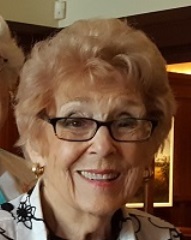
Collins mentioned several notable women who contribute to the mission trips, including Margarita Jones, the mission’s local contact who helps a lot of women and children in Belize, and LaDonna Cardinal, who has been Green’s assistant 35 years, and Janet Green, the dentist’s wife, who accompanies the mission trips and is paying for the schooling of a one of the children in Belize.
“Talk about empowering women!” Collins said. She ended her discussion with a shout out to her mother, Wilma Collins, who at 91 was the presiding elder of the International Women’s Day event.
Heather Watson recently moved to Perry from Redfield, but she is a native of Massachusetts whose mother moved to the Quad Cities area when Heather was a girl. The Drake University graduate and mother of three was the only African-American speaker on Saturday’s agenda, so her talk on “Overcoming Adversity” was perhaps immediately relevant to her.
“My story really starts at a very early age, having challenges with identity,” Watson told the audience. “Hopefully, some of you can relate to that challenge. I was given a perception based on the media and my peers of the ideal of what a woman is supposed to look like. So I had trouble fitting in. As you can see, I’m very tall. I was taller than most of my peers growing up, and I had really short hair. It’s funny because I accentuate all these things today that really challenged me when I was growing up.”

She said a negative self-image in childhood led to destructive behavior along with mental health issues involving low self-esteem and isolation. “As I moved toward adulthood,” she said, “I found myself trying to be seen and heard in ways that were socially unacceptable, to say the least.”
Watson said she takes responsibility for her actions. “A lot of my adversities were of my own doing,” she said. “They were choices that I made that had consequences attached to them. Moving forward, it’s been very challenging to overcome some of those, but I’ve been very successful, so I feel really good about that.”
Through tears she said she was at first uncertain how much personal history to disclose to women gathered for International Women’s Day, but she said she was made to feel “extremely comfortable” at the meeting and was “really grateful for that.”
“I identify as an addict,” she said, “and I’m actually very proud of that. I think my tears come from gratitude, actually, so don’t worry. I’m not, like, drunk right now or anything.”
Watson described the opportunity she took in 2010 to change her life and the positive outcomes that have followed from eight years of sobriety, illustrating her story with anecdotes that were sometimes funny and sometimes sad. She said she has a rich spiritual life. “I pray a lot,” she said.
A religious theme was also the bass tone of Janie Meyers’ talk, which she called “The Daffodil Principle,” a principle that involves “seeing something that we can do for others.”

She used the example of Gene and Dale Bauer of Running Springs, Calif., who started planting daffodil bulbs in their backyard in 1958. They eventually covered the sloping hills of their home in the San Bernardino Mountains with 60,000 flowers, and they opened their private garden for two weeks yearly for free public viewing. The Bauers retired in 2009 after opening the garden to the public for the last time.
“The daffodil garden taught me one thing,” Meyers said. “We are to move toward out goals and our desires one step at a time, to learn to love and to serve and to use the accumulation of time. When we multiply tiny pieces of time with small increments of daily effort, we too can accomplish magnificent things. We can make a difference in someone’s life.”
Meyers said she and her husband, Dale, had six children, and for a long time her family was the focus of all her labor. “But after Dale and I joined the Gideons, that focus changed,” she said. “I began to see people as God saw them, as souls, as people that needed to know they were valued and loved.”
She said the daffodil principle “has made a difference in my life. God has stretched me, but I wouldn’t go back.” She talked about seeing random acts of kindness change people’s lives, from people on the street to her work at Mitchellville prison and in hospice care.
“There are so many that we can touch people just one at a time,” Meyers said, “telling someone about being valuable, telling them that you appreciate them, writing them a note to let them know you care and are praying for them, taking time in the grocery store, when you pass an acquaintance, to actually talk and share and not just hurry on with your groceries. These are ways that we can tell people and show them God.”
The final speaker was Ann Connors, an Iowa City dentist and one of the original Ladies of La Poste. Connors somewhat reduced the emotional temperature of the gathering, which had been forcing liquid from the eyes of many present, by discussing “Women in Leadership Roles.”
Connors thanked the speakers who preceded her, noting how each demonstrated the virtue of courage, which is necessary to a leader, she said. She dated her own awakening as a young leader to a summer camp recommended to her by Perry High School Guidance Counselor Margaret Harden.
“She suggested I attend a new summer camp for young women’s leadership training,” she said. “This was probably 1977. It was at Camp Mitigwa near Boone, and it was there that I met and heard women who were leaders of the state.”
Connors said the camp opened her eyes to the possibilities of careers for women, including in politics, because there she met women who “definitely were change leaders in our communities and in our state.” Among the figure she met at the summer camp were Jean Lloyd-Jones of Iowa City, a longtime lawmaker in the Iowa Senate and Iowa House of Representatives, Lynn Germain Cutler, the first woman chairperson of the Black Hawk County Board of Supervisors, and Roxanne Conlin, a U.S. Attorney for the southern district of Iowa and a veteran of Iowa politics.
“They were there to urge us to explore our human potential,” Connors said. “It changed my life.” She learned that leadership “is the ability inspire, influence and guide people in a way that leads to a better quality of life,” that in difficult times “leaders have the courage to step up and make a move that’s not for the benefit of oneself but for others or for the community,” that “most importantly, leaders confront change and are not immobilized by it. They are not immobilized by the reality of change.”
Connors brought the day’s speeches full circle when she described a dental conference she recently attended in Sweden and the big differences she saw between the social and economic freedom available to women in the U.S. and to women in Sweden.
“The women I met there,” she said, “they talked about their importance because Sweden needs everyone in their workforce. So women proudly work, and they’re paid very well. They’re paid equally. And when they need maternity leave or family leave, both men and women have that, and they all get paid for it.”
Turning to recent scandals involving Harvey Weinstein, Dr. Larry Nassar and many, many others, Connors said, “These harassment, discrimination and abuse problems, to me, point to the importance of putting women in more and more leadership positions, power positions. Do women want this? That is the question. Do we want this? and how much of it do we want? Or maybe we do want it, but we just want to create a new and different culture, not an old, tired out, 1950’s culture of climb, climb, climb.”
She said succeeding in male-dominant economic and political spheres might not be the true goal of liberation.
“Creating a new culture, I think that this might be key,” she said. “I don’t have the answers at to what that is but as Nancy alluded to, you see in Perry on main street that there’s an awful lot of women opening businesses. Whatever the solution is, we can do it because we are problem solvers, and does that sound familiar to anyone here? I think it does.”
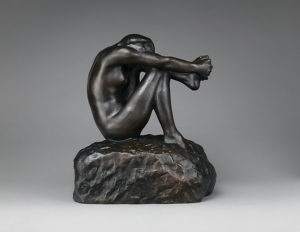
Connors closed with a coda on the World’s Columbian Exposition, the original world’s fair, staged in Chicago in 1893. Statues by Auguste Rodin, then Europe’s superstar sculptor, were brought to Chicago. Many were discovered to be figures of human nudes, from the corrupting sight of which women and children had to be protected. The nudes were sequestered behind black curtains, but an intrepid Chicago woman led private tours of the marble classics.
Jackson-Cavanaugh rounded out the set of stories by relating the immigration adventure of her friend Yasmin Dreller of Urbandale. Dreller’s family was ethnic Indian, and like many Indian families they lived as middle-class tradespeople in Uganda until they were stripped off their property and forced from the African country during the reign of Idi Amin in the 1970s. Courage was again the theme in Dreller’s story.
“International Women’s Day is celebrated with passion around the world,” Jackson-Cavanaugh said in conclusion. “Not so much in America yet, but maybe we can change that. On Thursday, March 8, take time to reflect on progress made and celebrate acts of courage and determination by ordinary women who have played an extraordinary role in the history of their country and community.”
I had hoped to find a female to write this story but am now glad I didn’t. International Women’s Day is a day that should be celebrated by everyone in Perry or at least by all of us who believe in liberty and justice for all.










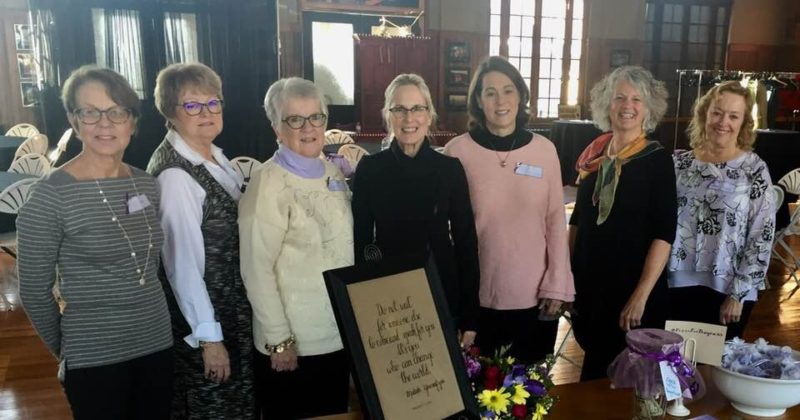
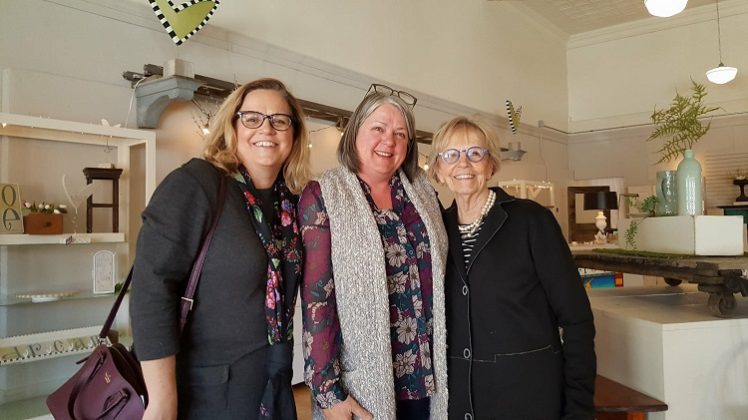
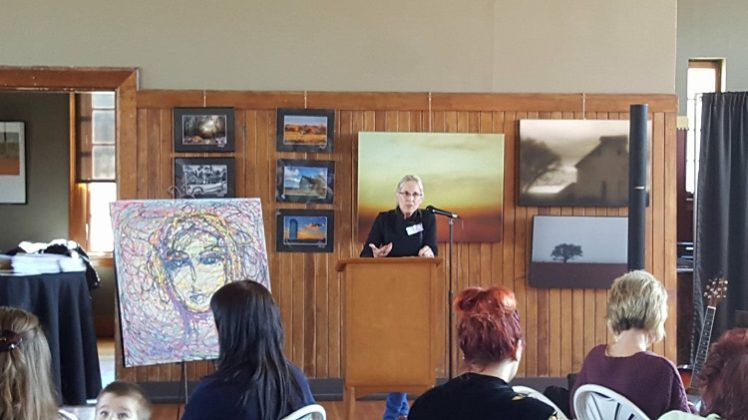
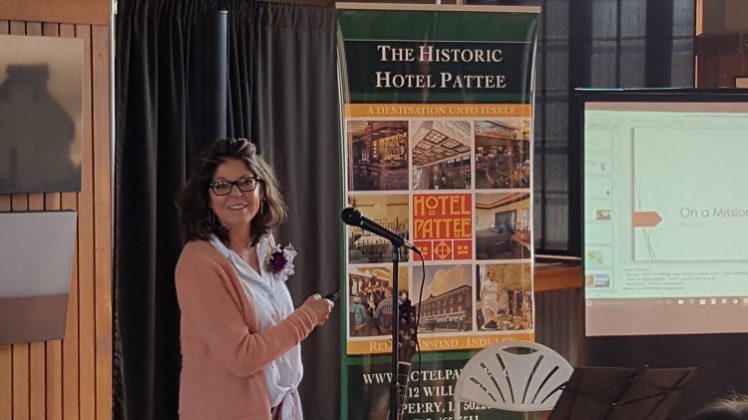
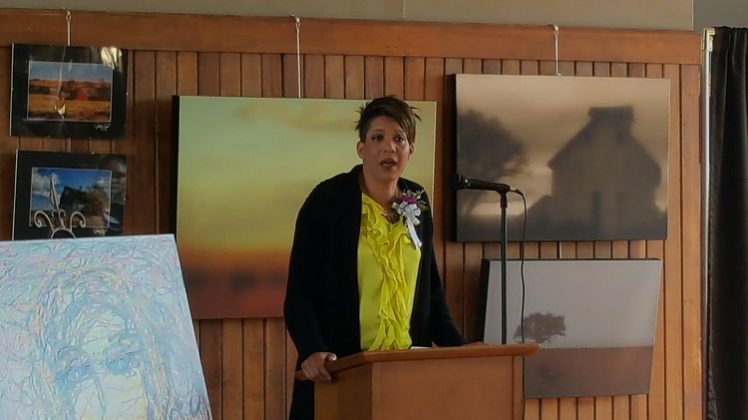
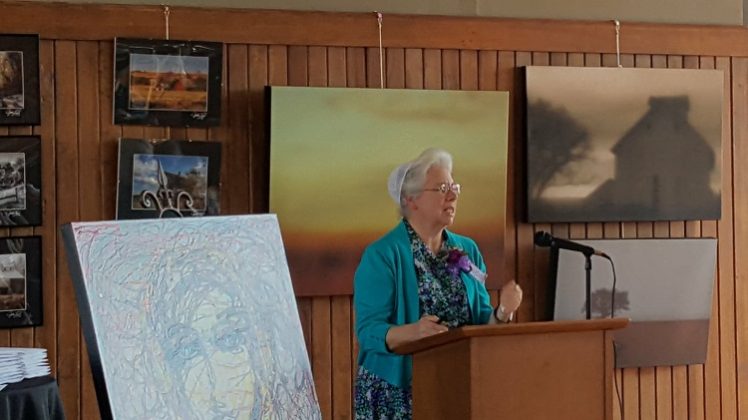
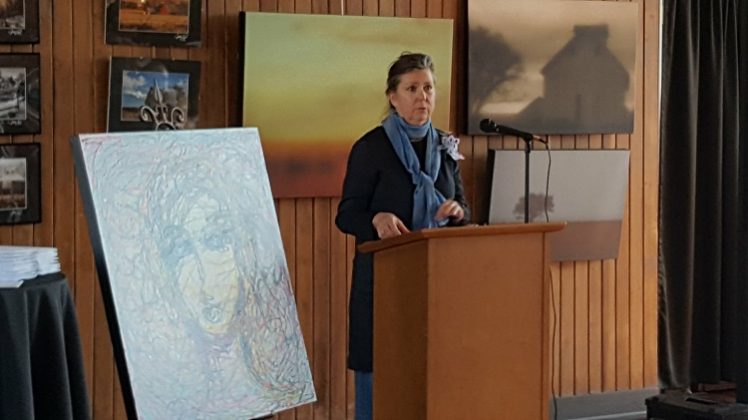
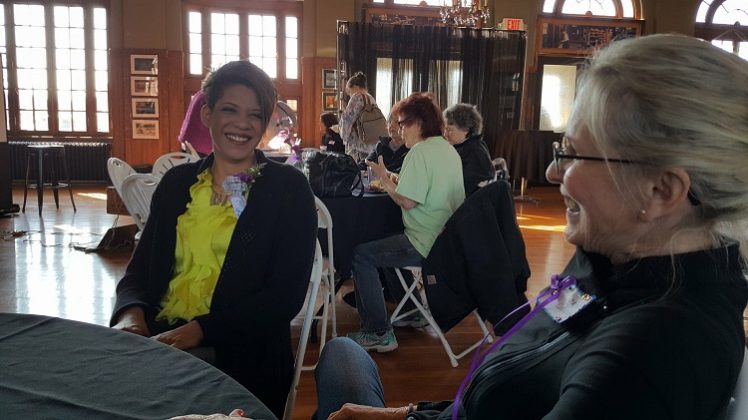
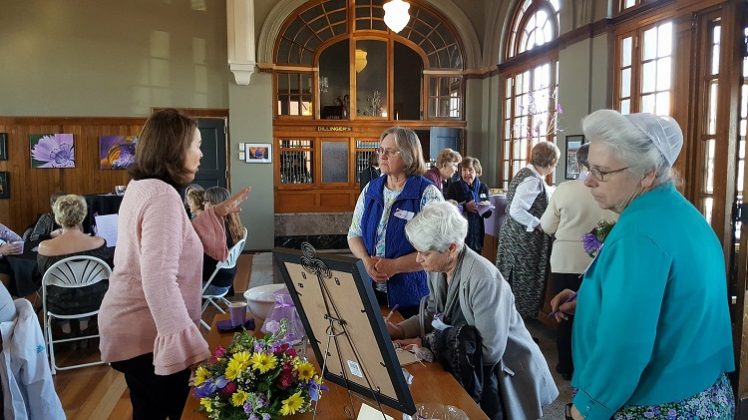
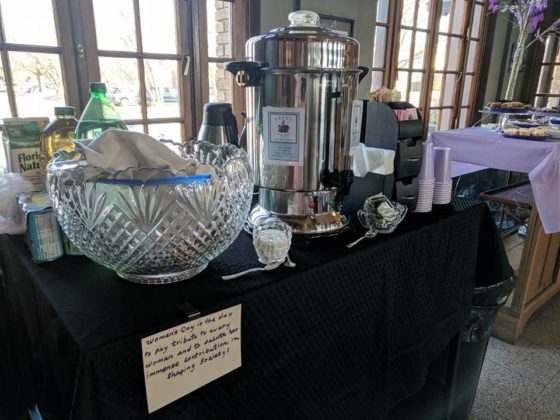
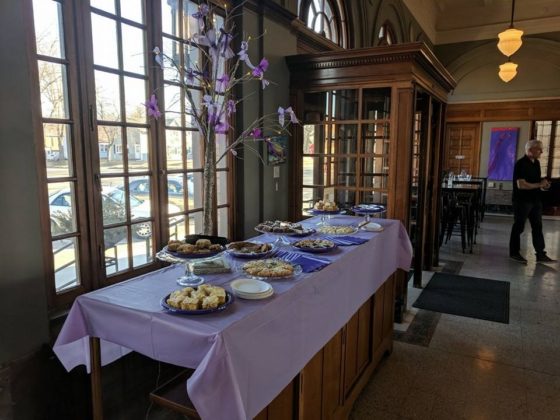

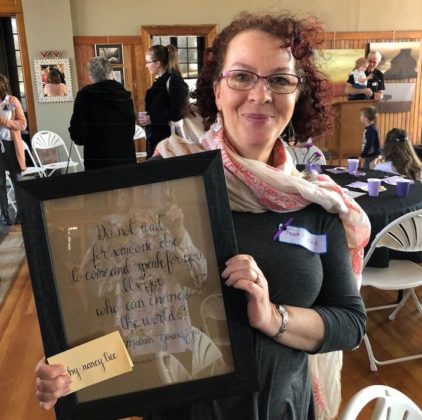








If you want to celebrate women’s achievements and if you want to help accelerate gender parity, then International Women’s Day is for you regardless of your gender! If you want to be able to empathize with others, one of the best ways to do that is to attend events like this and hear their stories. If we can only write about and represent our own stories and are not able to put ourselves into others’ shoes, then that won’t make for a very equitable or empathetic world. Feminism isn’t gender-specific. Congrats on celebrating International Women’s Day, Jim! Hopefully your first of many.
Thank you, Laura. My first in Perry but not my first.
Wonderfully written and expressed, Jim! I think you do ‘get’ women! 🙂 Thank you, my friend. What a telling event, stories that everyone needs to hear so that we are each appreciative of women’s advancements in the world.
Thanks for being there, Cheri!
Looking forward to next years International Women’s Day, bigger and better than ever. The concept, in my opinion, is valid. Somewhere in the academic databases of peer-reviewed research we can find data and knowledge relating to leadership linked to women. Predominantly, women’s inherent adaptation of being more gifted in emotional intelligence (EI) than their counterparts. We can find this knowledge under the query terms of ‘business leadership.’ Furthermore, we will see that EI is cited as exponentially more important that technical intelligence. The bearers of EI are the leadership integrators and innovators as opposed to the negative influence of egotistical leaders masked by charisma. Women have power far greater than the popular themes portrayed in modern media that allude to sexual dynamism. Simply stated in a quote by Robert Greenleaf:
“A new moral principle is emerging, which holds that the only authority deserving one’s allegiance is that which is freely and knowingly granted by the led to the leader in response to, and in proportion to, the clearly evident servant stature of the leader.” — Robert K. Greenleaf and Larry C. Spears, “Servant Leadership: A Journey into the Nature of Legitimate Power and Greatness.”
Dwell on that comment, “the servant stature of the leader,” and hopefully you can see that a servant leader is most often not perceived as a leader at all, until they are absent.
If our report was fuller or the event was videotaped, you would see that Ann Connors mentioned some of the data you cite regarding gender-based differences in leadership styles and related performance measures. Connors’ remarks about the longing for a changed culture pointed to the problem many people feel in calling women successful when they prove themselves to be as brutal and insensitive as so-called successful men. Would a female Trump, for instance, be a forward step in liberation? Connors would say no.
Jim, you provide a good argument against the perceived stereotype of a servant leader woman with exceptional emotional intelligence. I was working in Hawaii during the event, so I don’t know exactly what was presented. I guess I’m simply an advocate for that type of leadership, and on that note here’s a video of a female leader who has apparently captured the attention of a large group of males. She seems to be, in fact, an international woman.
https://www.youtube.com/watch?v=-jru_s_hc3Q
Wow, Jim, you could have written my speech! Thank you for being there, Jim, and we will see more men there in the future because the stories are about life. Congratulations and thanks to Carol for caring so much about Perry and bringing such a big crowd together to share and grasp our pride of our womanhood! I look forward to next year’s event.
Thanks, Ann. It was indeed a great day to celebrate the progress of life and leadership.
Thank you, Jim! I have always loved your thinking and writing as well as our conversations. Perry is fortunate to have people like you and Carol in the community. You both have great energy and are enthusiastic in sharing it. P.S. I miss your being my neighbor!
You are so very kind, Viivi. Thanks for sharing your story with us last week. You have survived through a miracle of fate and can still stand bravely in public and breathe that most dangerous word: “feminist.” Whatever good Carol and I might do here is because we have inherited your mantle. Thanks for being our teacher. And we’re still neighbors in the spirit!